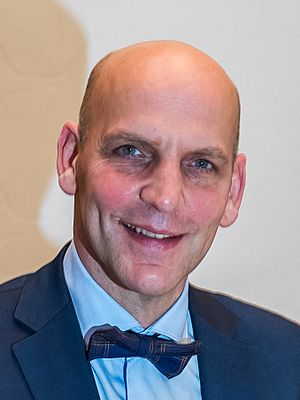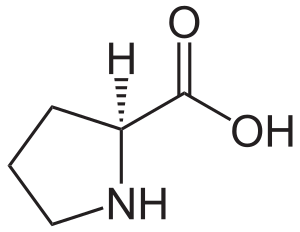Benjamin List facts for kids
Quick facts for kids
Benjamin List
|
|
|---|---|

Benjamin List in 2021
|
|
| Born | 11 January 1968 Frankfurt, West Germany
|
| Education | Free University of Berlin (Diplom) Goethe University Frankfurt (PhD) |
| Relatives | Christiane Nüsslein-Volhard (aunt) |
| Awards | Gottfried Wilhelm Leibniz Prize (2016) Nobel Prize in Chemistry (2021) |
| Scientific career | |
| Institutions | University of Cologne Max Planck Institute for Coal Research Hokkaido University |
| Thesis | Synthese eines Vitamin B 12 Semicorrins (1997) |
| Doctoral advisor | Johann Mulzer |
| Other academic advisors | Richard Lerner Carlos F. Barbas III |
Benjamin List (born 11 January 1968) is a German chemist. He is a director at the Max Planck Institute for Coal Research. He is also a professor of organic chemistry at the University of Cologne.
Professor List helped create a new way to speed up chemical reactions. This method is called organocatalysis. It makes chemical processes more efficient. In 2021, he won the Nobel Prize in Chemistry. He shared the award with David MacMillan. They were honored for developing "asymmetric organocatalysis."
Contents
Early Life and Family
Benjamin List was born in Frankfurt, Germany. He came from a family of scientists and artists. His great-grandfather, Franz Volhard, was a famous heart doctor. His aunt, Christiane Nüsslein-Volhard, also won a Nobel Prize in medicine in 1995. His parents separated when he was three years old.
Education and Research Career
Benjamin List studied chemistry at the Free University of Berlin. He earned his first degree in 1993. He then got his PhD from Goethe University Frankfurt in 1997. His PhD work was about making a special part of Vitamin B 12.
After his PhD, he moved to the United States. He worked as a researcher at the Scripps Research Institute. This was from 1997 to 2003.
Return to Germany
In 2003, List came back to Germany. He became a group leader at the Max Planck Institute for Coal Research. By 2005, he became one of the directors there. He led the Homogeneous Catalysis Department. From 2012 to 2014, he was the managing director of the institute.
Since 2004, he has also been a professor at the University of Cologne. He teaches organic chemistry there part-time. He also works as a lead researcher at Hokkaido University in Japan. He is the main editor for the science journal Synlett.
Discovering Organocatalysis
Benjamin List is known as one of the people who started organocatalysis. This is a special way to make chemical reactions happen faster. It uses small organic molecules as catalysts. Catalysts are like helpers that speed up reactions without being used up themselves.
Before this, chemists mostly used metals or enzymes as catalysts. But List found a new way. He discovered that a simple amino acid called proline could work as a very good catalyst. Proline is a natural molecule found in living things.
How Organocatalysis Works
List's discovery was important for "asymmetric reactions." In chemistry, molecules can sometimes be mirror images of each other, like your left and right hands. These are called "chiral" molecules. In medicines, often only one "hand" of a molecule works correctly.
Asymmetric organocatalysis helps chemists make only the "hand" of the molecule they need. This is very useful for making new medicines. It makes the process more precise and creates less waste. This is why it is called "greener chemistry."
List also developed new ways to use organic catalysts with textiles. These methods could help clean water, for example.
Nobel Prize Recognition
On October 6, 2021, Benjamin List received the Nobel Prize in Chemistry. He shared it with David MacMillan. Their work on asymmetric organocatalysis has greatly changed how medicines are made. It has also made chemical production much more environmentally friendly.
Personal Life
Benjamin List married Sabine List in 1999. They have two sons, Theo and Paul. In 2004, they survived the 2004 Indian Ocean earthquake and tsunami.
List believes in giving his children freedom to make choices. He once said that even if his child wanted to eat ten chocolate bars, he would trust them to learn from the experience.
Awards and Honors
Benjamin List has received many awards for his important work. Some of them include:
- 1997 Feodor Lynen Fellowship of the Alexander von Humboldt Foundation
- 2003 Carl-Duisberg-Memorial Award of the German Chemical Society
- 2004 Degussa Prize for Chiral Chemistry
- 2005 Novartis Young Investigator Award
- 2007 AstraZeneca Award in Organic Chemistry
- 2012 Otto Bayer Award
- 2013 Mukaiyama Award
- 2014 Cope Scholar Award, US
- 2016 Gottfried Wilhelm Leibniz Prize
- 2018 Member of the German National Academy of Sciences Leopoldina
- 2021 Nobel Prize in Chemistry
See also
 In Spanish: Benjamin List para niños
In Spanish: Benjamin List para niños
 | George Robert Carruthers |
 | Patricia Bath |
 | Jan Ernst Matzeliger |
 | Alexander Miles |


